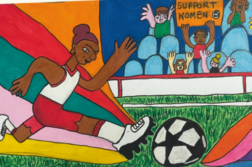The Premier League was being played in July. Fans were locked out of stadia and arenas across the country. EURO 2020 was, in fact, not played in 2020. Was this the strangest year in sporting history?
Never before has sport been so drastically impacted. At the start of the year, we had so much to look forward to. In football, Liverpool were running away with the Premier League and were breaking record after record. EURO 2020 was on the way. Sheffield United were on course for, at the very least, a Europa League spot. We had the Olympic Games to be excited for – a summer like that of 2018, where everyone got behind Gareth Southgate and the England side at the World Cup was to be compounded by the sense of patriotism that everyone feels during the Olympics.
The coronavirus pandemic has had such a devastating impact on sport – here, we look at the top 5 things to come out of this most crazy year in sport.
5. The sporting calendar was completely reworked.
After 100 days without Premier League action, Aston Villa and Sheffield United took to the grass at Villa Park. They played out a 0-0 draw, and despite the dull game, fans were grateful to see sport return. It was admittedly an unfamiliar feeling for sports fans – seeing competitive, domestic football in June is a rarity – but what it showed was a commitment to see elite sports resuming as normal, or at least as normally as possible.
Many organisations had to come together to oversee the changes in the calendar. In football alone, FIFA, UEFA, the respective Football Associations in each country, the leagues themselves (the list goes on) all had to come together to agree how it could resume. A year long delay to UEFA Euro 2020 (still called EURO 2020 despite now being played in 2021) is not as simple as just picking the tournament up and moving it. UEFA Women’s EURO 2021 has since been moved to the summer of 2022 so as not to clash with the men’s tournament, which means we will have a summer of European competition in 2022 followed by the World Cup later that year in the winter.
The Olympic and Paralympic Games were moved by a year to 2021, which had ramifications for the World Athletics Championships which will now take place in Summer 2022 in Oregon. The Six Nations resumed in October, with Ireland’s game against Italy – postponed when Italy was deemed the epicentre of the pandemic in Europe – kicked off the remainder of the tournament.
All in all, the sporting calendar has been completely reworked and we will see the ramifications of this for years to come.
4. Tournaments were changed – and might not return to normal, if these formats are preferred.
The Champions League – Europe’s elite competition – was restructured completely so that it could be safely concluded. Paris Saint-Germain lost 1-0 in Lisbon in the final against Bayern Munich after the second leg games of the round of 16, as well as the quarter finals and semi-finals, were played in a winner-takes-all tournament in Portugal, rather than teams travelling across Europe to fulfil fixtures. On top of this, to ensure the tournament could be completed quickly, UEFA elected to drop the traditional two-legged structure of the knockout phase. The quarter-finals and semi-finals were played as single-leg games.
The cancellation of two-legged games has been crucial in making space in the football calendar; the League Cup has lost its two-legged semi-final, the FA Cup has lost its replays, and this provides vital time in the domestic football schedule here in England.
Owen Farrell was the top scorer in a new tournament, the Autumn Nations Cup, in rugby. Rather than the regular end of year tests, so as to avoid extended travel, the Nations Cup was brought in as an autumn tournament to replace this somewhat. Lo and behold, an incredible final saw England take the tournament in an extra-time sudden-death victory over a young, inexperienced France team.
Whether these changes will last is yet to be seen, but they do improve the quality of some of the sports.
3. Sports clubs adapted to the needs of the people during the pandemic.
From offering their stadium’s hotels to key workers, to donating food to charity, sports clubs had huge corporate social responsibility.
Cricketers Stuart Broad and Harry Gurney, who couldn’t play in their games, came up with a genius idea. They co-own pubs, which were forced to close during the first lockdown. They re-opened the pubs as village shops/takeaways, which meant the communities they served had access to good food, and their staff continued to make money.
Watford FC’s Vicarage Road ground, adjacent to Watford General Hospital, was offered to the NHS to make more room for meetings, training and childcare. Spurs did the same at the Tottenham Hotspur Stadium whilst Chelsea FC offered their Millennium Hotel at Stamford Bridge, as they are just a short distance from Chelsea and Westminster Hospital in London.
Finally, #makethatcall emerged, where players and staff from sports clubs called their vulnerable, shielding supporters for a chat. Everton’s head coach Carlo Ancelotti rang a vulnerable fan with Motor Neurone Disease (MND), and it makes for a lovely couple of minutes’ listening!
2. Technology caused more problems than ever.
Admittedly, the one thing that fans probably didn’t miss during lockdown was the constant stress over technology in sport. A big debate as sport began to filter its way back into our lives was how we take in sport – do we want fake crowd noises or the authenticity of hearing the players, coaches, and referees on the field. Within minutes, goal line technology failed on the return to league action in England’s top tier for the first time in 9,000 matches when Aston Villa goalkeeper Orjan Nyland carried the ball into his own net. VAR isn’t used for goal line decisions due to the precision of the goal line technology software, provided by Hawkeye. Aston Villa got a point that day in the 0-0 draw – and managed to stay up, conveniently, by a point. What a different season we might be having now if the technology hadn’t failed!
VAR has been the subject of controversy all year and still continues to be so. Will technology ever answer all of our prayers?
1. Fans left, and came back.
I have regularly told the story of the fact that I took the impulsive decision to purchase tickets to watch my team, Fleetwood Town, play against Portsmouth at Fratton Park. I am grateful that I was able to see my team play just before lockdown.
Fans have since had a big struggle to see their teams play, whether it is in football, rugby, cricket, athletics – and finally, on December 2, the government allowed for elite sports to welcome fans in again. With many areas, at the time of writing, in Tier 3 of the English COVID-19 restrictions, it is becoming more difficult to see fans in sport – but it is a fantastic sight to behold and I am very much looking forward to returning to a football ground to watch my beloved Cod Army again.
And to top it all off, Ryan Reynolds and Rob McElhenney took over a small Welsh football team. Could it get any stranger?
We’ll find out in 2021.



